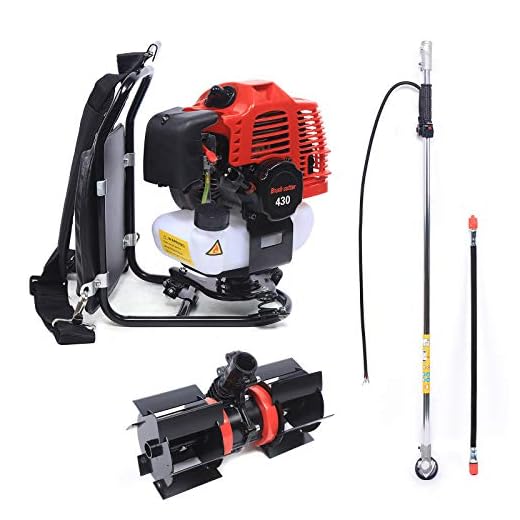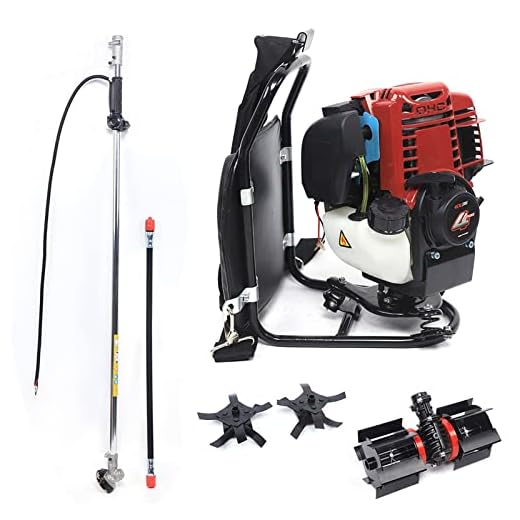




When it comes to gardening and lawn maintenance, one common problem that many people face is dealing with roots. Roots can be a major obstacle when it comes to cultivating the soil and can make gardening tasks difficult and time-consuming. In order to tackle this issue, many gardeners wonder if a cultivator can cut through roots effectively.
A cultivator is a handy tool that is frequently used for tilling and loosening the soil, making it easier to plant and maintain gardens. However, when it comes to cutting through roots, the effectiveness of a cultivator can vary. While some cultivators are specifically designed to handle roots, others may not have the power or design to effectively cut through them.
It is important to choose the right cultivator for your needs if you are facing a root problem in your garden. Look for cultivators with strong and sharp tines that are specifically designed for cutting through roots. These types of cultivators will be more efficient in tackling root obstacles and will save you time and effort in your gardening tasks.
Additionally, it is always a good idea to assess the size and thickness of the roots you are dealing with. While some cultivators may be able to handle smaller roots, larger and thicker roots may require a more powerful tool, such as a chainsaw or an axe, to cut through. It is important to use the right tool for the job to avoid damaging your cultivator or injuring yourself.
In conclusion, while a cultivator can be a valuable tool for gardening and lawn maintenance, its effectiveness in cutting through roots can vary. It is important to choose a cultivator with strong and sharp tines that are specifically designed for cutting through roots, and to assess the size and thickness of the roots you are dealing with. By using the right tool for the job, you can effectively cut through roots and make your gardening tasks easier and more efficient.
Benefits of using a cultivator
Using a cultivator can provide numerous benefits for both professional gardeners and home gardeners. Whether you have a large garden or a small backyard, utilizing a cultivator can make your gardening tasks easier and more efficient.
1. Soil preparation
One of the primary benefits of using a cultivator is its ability to prepare the soil for planting. Cultivators are equipped with tines or blades that break up compacted soil, removing weeds and creating a loose and fertile bed for plants to thrive in. This helps to improve soil aeration, drainage, and nutrient absorption.
2. Weed control
Cultivators are effective tools to control weeds in your garden. By tilling the soil, cultivators uproot young weeds, making it easier to remove them manually or with the help of a hoe. This reduces competition for nutrients, water, and sunlight, preventing weed overgrowth and promoting healthier plants.
3. Mixing amendments
When you need to mix organic matter or soil amendments into your garden beds, a cultivator can come in handy. Its rotating tines or blades thoroughly incorporate compost, peat moss, or other materials into the soil, ensuring even distribution and enhancing the overall fertility of your garden.
4. Saving time and energy
Using a cultivator can greatly reduce the time and physical effort required for maintaining your garden. With its efficient tilling and weeding capabilities, a cultivator allows you to complete tasks faster, leaving you with more time to enjoy your garden. Cultivators also help to minimize strain and fatigue on your body, making gardening a more enjoyable experience.
In conclusion, a cultivator is an essential tool with numerous benefits for gardeners of all levels. From preparing soil and controlling weeds to mixing amendments and saving time, a cultivator can significantly improve the health and productivity of your garden.
Understanding the role of roots
Roots play a crucial role in plant growth and development. They serve multiple functions that contribute to the overall health and vitality of a plant. Understanding the importance of roots can help gardeners and cultivators make informed decisions when it comes to cutting through them with a cultivator.
Functions of roots
Roots have various vital functions that are essential for the survival of plants:
| Function | Description |
|---|---|
| Anchorage | Roots anchor the plant in the soil, providing stability and preventing it from being uprooted by wind or other external forces. |
| Water absorption | Roots absorb water from the soil, which is necessary for the plant’s hydration and the transport of essential nutrients throughout the plant. |
| Mineral absorption | Roots also absorb essential minerals from the soil, such as nitrogen, phosphorus, and potassium, which are necessary for the plant’s growth and development. |
| Storage | Some roots are specialized for storing food and nutrients, serving as a reserve for plants during times of drought or nutrient scarcity. |
| Transportation | Roots facilitate the transport of water, nutrients, and sugars to the rest of the plant through their vascular tissues. |
Cutting through roots with a cultivator
When using a cultivator, it is important to exercise caution when cutting through roots. Damage to the roots can impact the overall health and vigour of a plant. Avoid cutting through large and essential roots, as this can cause significant harm to the plant and hinder its growth.
Prioritize using the cultivator in areas where the root system is less dense or where smaller, non-essential roots are present. By doing so, you can minimize the potential damage to the plant’s root system and promote better overall growth.
Remember: understanding the role of roots and the functions they serve is crucial for maintaining the health and vitality of plants. Exercise care when using a cultivator to ensure that you do not cause unnecessary harm to the root system.
How cultivators work
A cultivator is a gardening tool used to break up and loosen soil in gardens and farmland. It consists of multiple prongs or tines that are designed to dig into the earth and mix up the soil, making it easier for plants to grow.
When a cultivator is pushed or pulled along the ground, the tines penetrate the soil and break up any clumps or compacted areas. This allows air, water, and nutrients to reach the plant roots more effectively, promoting healthier growth.
Cultivators can be manual or powered by an engine. Manual cultivators require physical effort to operate and are typically used for smaller areas or light gardening work. Powered cultivators, on the other hand, use either gas or electric engines to rotate the tines and break up the soil. These are more suitable for larger areas or tougher soil conditions.
In addition to breaking up soil, cultivators are also used to remove weeds and unwanted vegetation. The rotating tines can uproot and cut through roots, making it easier to clear the area of any unwanted plants.
Overall, cultivators play a crucial role in preparing soil for planting and maintaining garden beds. They provide aeration, create a loose and fertile soil environment, and help control weed growth, making them an essential tool for any gardener or farmer.
Can cultivators damage roots?
Introduction
Cultivators are powerful gardening tools that are often used to prepare soil for planting by loosening it and breaking up clumps. While cultivators can be effective in improving soil quality, there is a concern that they may also damage the roots of plants.
Potential for root damage
When using a cultivator, there is a risk of accidentally cutting or damaging plant roots. This can occur if the cultivator is not used correctly or if it comes into contact with the roots while working the soil.
Protecting plant roots
To minimize the risk of root damage when using a cultivator, it is important to be cautious and take certain precautions:
- Know your plants: Different plant species have different root structures. Understanding the root growth habits of the plants in your garden can help you avoid damaging their roots.
- Use the right tool: Make sure you choose a cultivator that is appropriate for the size and type of plants you have. Using a cultivator with small tines or attachments can be less likely to damage roots.
- Be mindful of depth: Adjust the depth of the cultivator’s tines to avoid going too deep into the soil and damaging the roots. Keeping the tines shallow can help protect the roots while still effectively working the soil.
Conclusion
While cultivators have the potential to damage plant roots if used improperly, taking appropriate precautions can minimize this risk. By being mindful of the type of plants in your garden, using the correct cultivator, and adjusting the depth of the tines, you can effectively work the soil without causing harm to the roots.
Factors to consider when using a cultivator near roots
When using a cultivator near roots, it is important to consider several factors to protect the health and stability of the plant. Failure to do so may result in damage to the plant’s roots, which can have detrimental effects on its overall growth and survival. Here are some key factors to keep in mind:
- Root depth: Understand the depth at which the roots of your plants grow. This will help you determine the appropriate depth setting for your cultivator. Avoid digging too deep and cutting through the main roots, as this can severely damage the plant.
- Type of cultivator: Different types of cultivators have different capabilities and features. Some cultivators are specifically designed to work near roots, while others may not be suitable for such tasks. Choose a cultivator that is compatible with your plants and their root system.
- Cultivator attachments: Some cultivators come with specialized attachments such as root cutters or root shields. These attachments can provide added protection to the roots while allowing you to perform necessary cultivation tasks. Consider using these attachments to minimize the risk of root damage.
- Soil moisture: Working with overly wet soil can increase the chances of compacting the soil and damaging the roots. Ensure that the soil is adequately dry before using a cultivator near the roots to prevent unnecessary damage.
- Root health: If the roots of your plants are already weak or damaged, exercise caution when using a cultivator nearby. Fragile or compromised roots are more susceptible to further damage, so it is advisable to avoid extensive cultivation in these areas.
By considering these factors and taking necessary precautions, you can successfully use a cultivator near roots without causing harm to your plants. Remember, the goal is to maintain the health and stability of the root system to promote optimal plant growth and development.









